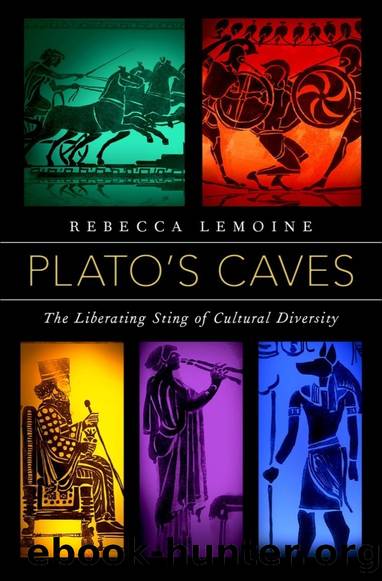Plato's Caves: The Liberating Sting of Cultural Diversity by Rebecca LeMoine

Author:Rebecca LeMoine [LeMoine, Rebecca]
Language: eng
Format: epub
ISBN: 9780190936983
Google: 2MHADwAAQBAJ
Amazon: 0190936983
Barnesnoble: 0190936983
Goodreads: 52163120
Publisher: Oxford University Press
Published: 2019-04-15T00:00:00+00:00
Socratesâ Myths of Athens through Aspasiaâs Voice
The oration commences with the myth of Athenians as autochthonous, or born of the earth. According to the myth, âthe birth of their ancestors was not in a foreign land (οá½Îº á¼ÏÎ·Î»Ï Ï), and thus the descendants they produced did not migrate (μεÏοικοῦνÏαÏ) to this country with their own having come from another place (á¼Î»Î»Î¿Î¸ÎµÎ½), but were autochthonous (αá½ÏÏÏθοναÏ), living and dwelling in their true fatherland, nurtured not by a stepmother as others are, but by a mother, the country in which they livedâ (237bâc).28 For a metic to boast of Athenian autochthony is ironic, as Aspasia cannot share in the kinship the myth generates. Such myths apply only to Athenians, not foreign transplants like herself. The separation of author from speech calls attention to the dismembering such myths perform. Autochthony myths generate unity by delineating âusâ and âthem,â a tension Aspasiaâs authorship amplifies. Heard through her voice, the mythâs repeated use of the negativeâAthenians were not born in a foreign land, did not migrate, and were not raised by a stepmotherâbecomes more antagonistic. Indeed, a core function of these myths was to distinguish Athens from cities whose foundation stories involved immigration.29 Aspasiaâs voice reminds of the multitude of myths celebrating her native Miletusâ foreign founding and its history of peaceful interaction between Greeks and non-Greeks.30 Accentuating the oppositional nature of Athenian autochthony myths, Aspasiaâs authorship invites listeners to inquire whether unity is compatible with a rhetoric of hostility toward those with whom one shares the land. Through this, Socrates shows how engaging foreign voices can illuminate the tensions in oneâs thinkingâhere, the tension in Socratesâ belief that telling citizens the noble lie that they are born from the earth will only generate unity (Republic 414bâe).
Aspasiaâs authorship also highlights the discrepancy between Athenian speech and deed, showing that Athenians do not practice the complete separation from foreigners that their myths of autochthony preach. Amid all the talk of mothers and stepmothers, Aspasiaâs own motherhood points to the evidence that undermines the Atheniansâ claim to autochthony. Although her son with Pericles, Pericles the Younger, was disqualified from citizenship under the citizenship law of 451/50 bc for having a non-Athenian mother, he was later, around 430/429 bc, granted citizenship.31 Only thus was he qualified to serve as one of the generals tried en masse and executed after the battle of Arginusae.32 At least one Athenian citizen, thenâa prominent one at thatâdescended from a non-Athenian. Ancient reports of other illegitimate sons being granted citizenship and of the bestowing of citizenship on large groups of foreigners during the Peloponnesian War, combined with the fact that Periclesâ citizenship law likely did not apply retroactively, suggest Pericles the Younger was not the only Athenian citizen of mixed blood.33 Aspasiaâs voice thus serves as a bold reminder that Athenians often favored the inclusion of foreigners, despite attempting through autochthony myths to make metics perpetual immigrants.34 If myths of pure lineage not only spur conflict between those âborn of the earthâ and everyone
Download
This site does not store any files on its server. We only index and link to content provided by other sites. Please contact the content providers to delete copyright contents if any and email us, we'll remove relevant links or contents immediately.
Spell It Out by David Crystal(36113)
Life for Me Ain't Been No Crystal Stair by Susan Sheehan(35807)
Cecilia; Or, Memoirs of an Heiress — Volume 1 by Fanny Burney(32550)
Cecilia; Or, Memoirs of an Heiress — Volume 2 by Fanny Burney(31950)
Cecilia; Or, Memoirs of an Heiress — Volume 3 by Fanny Burney(31933)
The Great Music City by Andrea Baker(31919)
Professional Troublemaker by Luvvie Ajayi Jones(29652)
The Secret History by Donna Tartt(19062)
We're Going to Need More Wine by Gabrielle Union(19038)
Twilight of the Idols With the Antichrist and Ecce Homo by Friedrich Nietzsche(18627)
All the Missing Girls by Megan Miranda(15967)
Cat's cradle by Kurt Vonnegut(15340)
Pimp by Iceberg Slim(14490)
Bombshells: Glamour Girls of a Lifetime by Sullivan Steve(14062)
For the Love of Europe by Rick Steves(13955)
Talking to Strangers by Malcolm Gladwell(13353)
Norse Mythology by Gaiman Neil(13352)
Fifty Shades Freed by E L James(13236)
The Social Justice Warrior Handbook by Lisa De Pasquale(12188)
